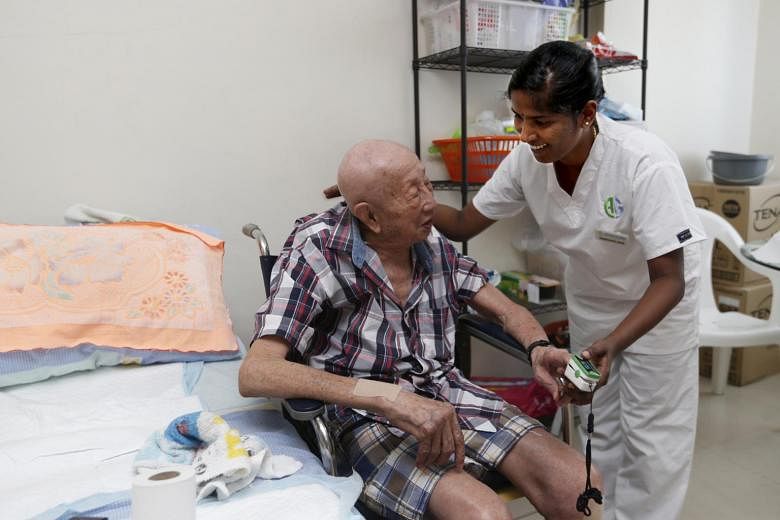Should one offer a listening ear or an extra pair of hands to a stressed out caregiver torn between work and caregiving responsibilities?
A recent study has found that it is better to be that family member or friend whom the caregiver can confide in, rather than one who renders practical help by bathing or feeding his ageing parents.
The study, done by researchers from Duke-NUS Medical School, is the first here that examines the role of social support from family and friends in alleviating the depressive symptoms that working caregivers face, especially when their work is interrupted by caregiving duties.
Data from 662 working caregivers who cared for an older family member aged 75 and above were drawn out of the Singapore Survey on Informal Caregiving and analysed. That survey was conducted by the Ministry of Social and Family Development in 2010 and 2011.
The latest findings showed that the caregiver experiences more depressive symptoms when he or she faces more disruptions at work due to caregiving, be it being late for work or taking leave for a medical appointment in the course of caring for the older person at home.
The study, published online in the journal of Ageing And Mental Health in April, also found that having a family member or friend whom the caregiver trusts to talk to, whether to share sentiments, seek understanding or vent frustration, reduces the degree of depressive symptoms he or she faces.
However, having friends or family members over to help the older person with eating, showering, going to the toilet or walking did not have an impact on the mental well-being of the caregiver.
At times, such form of help even increased the level of distress.
Dr Rahul Malhotra, assistant professor at Duke-NUS and co-author of the study, said: "This could be because having emotional support helps reassure the caregiver of his or her self-worth.
"Some caregivers may feel helpless and talking it through can also reduce the stress or anger that the caregiver feels when work is interrupted while caring for the person at home.
"During moments that are perceived as uncontrollable, such as care-related work interruptions, research has shown that emotion-focused coping techniques may be more effective than problem-focused coping techniques."
The study noted that tangible help provided by other people may lead to more stress if it is inadequate or not done well enough.
Ms Anita Ho, assistant director at Awwa Caregiver Service, said the findings are in line with the experiences of some of the caregivers that the non-profit organisation trains.
"Sometimes, the practical support that family and friends give may not be congruent with the needs of the caregivers. For example, they are not providing the help that is required or at the time at which it is required," said Ms Ho.
"At other times, caregivers may face even more stress as a result of having high expectations and end up feeling disappointed with the help that they get, resulting in conflicts and strained relationships," she added.
Ms Chua Hui Keng, care manager at Tsao Foundation, which runs several services for the elderly, said caregivers need a range of resources for support, both emotional and practical.
"Caregivers who are as old as their spouses that they are caring for are likely to appreciate more practical help, but those already getting help from domestic workers may find it more beneficial to have trusted people to share their worries with," said Ms Chua.
Given the findings, Dr Malhotra said policymakers and employers should recognise that formal workplace-based caregiver support needs to be supplemented with measures that look into their psychological and emotional needs.
There is no national caregiving leave here, although civil servants get two days of parent-care leave each year and some companies offer family or eldercare leave.
Said Dr Malhotra: "Employers should adopt flexible working policies not merely to accommodate caregiving needs but also to allow working caregivers to reconnect with their families and friends as a form of respite and facilitate leisure activities outside of work."


